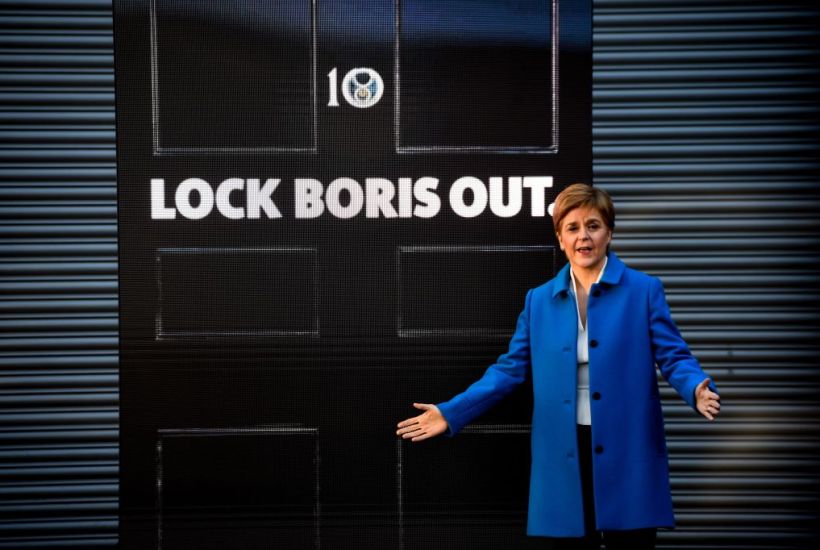It’s hard to believe in these early weeks of 2021, when the country is grappling with an unprecedented national health and economic crisis, that anyone could contemplate willingly throwing into the mix a constitutional crisis. Issuing a clarion call to break apart, when it could not be clearer we need to pull together. Yet that appears to be the course on which the SNP Government in Edinburgh is set with its 11-point plan for independence.
For the UK Government to reject a demand to hold any time soon another referendum on Scottish independence is not, as Nicola Sturgeon would have it, ‘a denial of democracy’; it’s plain common-sense and the responsible thing to do.
Dealing with the Covid-19 pandemic and its economic and social consequences has tested to the limit resources north and south of the border, and will continue to do so for the foreseeable future.
The idea that government resources should be diverted from the task of recovery to conduct what would inevitably be another costly and divisive referendum will strike many as a profoundly wrong-headed ordering of priorities. It will entail potentially damaging consequences, not just for Scotland, but throughout the UK.
And to suggest that for Scotland independence is the Covid recovery plan is, to many, incredible. Since 2014 the economic and other public policy fundamentals have become even more difficult for those making the case for independence. How can independence be the answer to Covid when credible responses to the fundamental questions raised during the last independence referendum – on currency, funding for public services, borders and trade within the UK have never been provided?
It’s clear though that simply explaining to people in Scotland why now is not the time for another independence referendum isn’t a sufficient or sustainable long-term strategy for supporters of the Union. This is the problem that Policy Exchange’s Future of the Union project, which launched this week, and is the only one of its kind in Westminster, will seek to address over the coming months.
With Brexit complete, we’ve taken back control. Now people expect to hear from the UK Government how this control will be exercised and to what purpose. And Covid has drawn peoples’ attention – many for the first time – to the realities of UK government decision-making in a world with devolved governments and legislatures. There’s also a palpable sense that after Brexit and Covid life cannot simply return to where we were before. This feels like a watershed moment requiring national renewal for the UK as well.
So here are four essential elements for a strong and successful Union in the 21st Century.
To succeed requires first and foremost the right governing attitude and tone. The UK is the world’s most successful joint venture in which England, Scotland, Wales and Northern Ireland have always played their full part. The UK must continue to look and feel like a shared endeavour as we go forward. A country where the man in Whitehall accepts he doesn’t always know best and devolution isn’t regarded as a disaster. A country in which minority voices are heard and taken account of. A country whose very diversity fuels its dynamism.
The second ingredient of success is to recognise that devolution is an unfinished, not a failed, project. Over two decades, more significant powers have been devolved from London to Cardiff, Edinburgh and Belfast. The Scottish parliament, for example, is one of the most powerful devolved legislatures anywhere in the world. Yet while central and devolved governments have their distinct areas of decision-making responsibility, Covid has exposed the extent to which they depend on each other to be effective.
The need to consult each other and to find agreement has never been greater. Yet there has been little equivalent development of the resilient architecture to manage inter-governmental relations within the UK to match a 20-year dispersal of power – the necessary machinery to promote co-operation, manage disputes and facilitate joint decision-making. A reform of this architecture – with a revamped and enhanced Intergovernmental Council at its heart – is urgently required as it is part of the essential glue that binds together the United Kingdom.
The third essential element is to take forward devolution in England. The UK continues to be beset by significant regional economic inequalities. The Government is therefore right to pursue its levelling up agenda. The evidence is that voters don’t want even more politicians or new and expensive tiers of government. What they do want is local leaders with the incentives to work together and the tools to drive forward their regional economies, creating alternative magnets for economic activity to match the power of London and the South East.
And devolution in England should matter to people in Scotland, Wales and Northern Ireland as well. Growing regional economies in England will provide growing markets for Scottish, Welsh and Northern Ireland businesses, and strengthening the collective voice of the more peripheral areas of the UK.
This may not have the tidiness of a federal solution. But soundbite solutions like federalism are not the answer. There is no example of a successful federal state anywhere in the world where one part represents over 80 per cent of the population of the whole. Establishing a separate English executive or parliament far from securing the Union, risks irrevocably de-stabilising it.
The final priority is to put power in the hands of local communities within Scotland, Wales and Northern Ireland. Local empowerment shouldn’t stop on the doorstep of Cardiff Bay, Stormont or Bute House – for the citizens of Aberdeen, Inverness or Dumfries, rule from Edinburgh often feels as remote as London.
That’s why I’ve recommended to the Prime Minister a new co-operation fund to promote even greater joint working between the UK and devolved governments, which responds to locally identified priorities and acts on areas of common concern from preventing drug abuse to tackling our productivity challenge and climate change. After all, while we should value as a country what we are able – as a result of devolution – to do differently, we should also take care not to squeeze out what we can and should be doing together.
At this moment of national crisis surely we should be making certain that the UK is working as well as it possibly can, delivering for families in every corner of the land and helping them to recover from what has been a collective ordeal. A practical, open, generous, forward-thinking and inclusive Unionism will always triumph over narrow, ideological, exclusive and divisive nationalism. To borrow from last month’s inaugural address by the 46th president of the United States, Joe Biden: ‘With unity we can do great things’.
Got something to add? Join the discussion and comment below.
Get 10 issues for just $10
Subscribe to The Spectator Australia today for the next 10 magazine issues, plus full online access, for just $10.
Andrew Dunlop is a former UK Government Minister for Scotland and Northern Ireland




















Comments
Don't miss out
Join the conversation with other Spectator Australia readers. Subscribe to leave a comment.
SUBSCRIBEAlready a subscriber? Log in